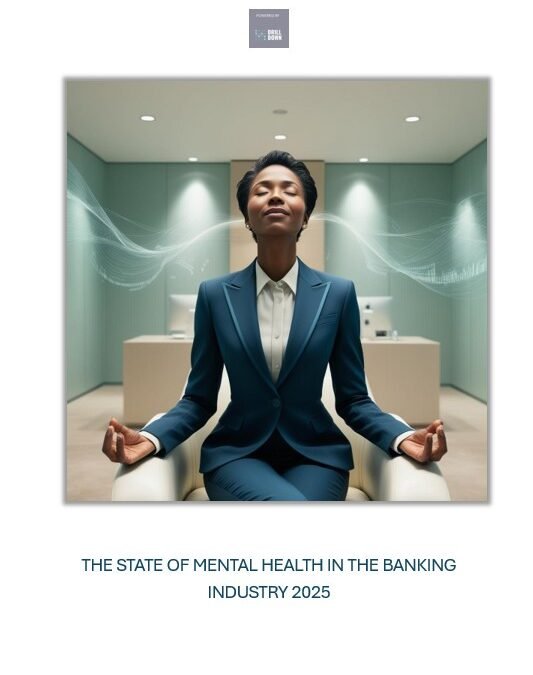The State of Mental Health in South Africa’s Banking Industry – Challenges and Paths Forward
Introduction
In South Africa’s fast-paced banking sector, where performance targets, regulatory pressures, and customer demands dominate daily life, mental health has emerged as a critical concern. With the country’s workforce ranked among the most stressed globally—second only to Nigeria—the banking industry faces unique challenges in supporting employee well-being. At Drilldown Mindful Banking, we’re committed to addressing these issues with free, evidence-based resources rooted in psychology, Mindfulness, and AI. This blog explores the current state of mental health in South African banking, highlighting challenges, progress, and opportunities for creating healthier workplaces.
The Mental Health Landscape in South African Banking
South Africa grapples with a mental health crisis, with up to one-quarter of employees facing depression during their careers, yet only 15-25% seeking help, according to the Employee Assistance Professionals Association of South Africa. This costs the economy an estimated R19 billion annually in lost productivity due to absenteeism. For bankers, the stakes are even higher. Research shows that 36% of finance workers experience stress or anxiety more than half the time, with 44% citing overwork as a major mental health strain. Economic pressures like load shedding, rising living costs, and 44% of citizens with impaired credit records add financial anxiety, hitting banking employees hard—both professionally and personally.
The banking environment amplifies these stressors. Long hours, tight deadlines, and the need to navigate complex regulations create a perfect storm for burnout, anxiety, and depression. Frontline staff face intense customer interactions, while executives grapple with strategic pressures in a volatile economy. The 2021 Mental State of the World Report ranked South Africa among the lowest for mental well-being, with 35.8% of the population distressed or struggling—a reality that banking leaders can’t ignore.
Progress in Addressing Mental Health
Despite these challenges, South Africa’s major banks have taken meaningful steps to support their employees:
- Standard Bank offers its BeWell program, providing 24/7 telephonic counselling through an Employee Assistance Programme (EAP) and trauma support, aiming to ensure comprehensive care.
- Absa Bank has made strides with a 2022 mental health campaign that reached 4,997 employees, offering mindfulness sessions, a mental health app, and ICAS counselling services. Their EAP saw a 32.6% utilization rate, tackling stress, anxiety, and burnout.
- Nedbank provides free counselling through ICAS for employees and families, emphasizing mental, financial, and lifestyle health as part of its Employee Wellbeing Programme.
- First National Bank (FNB), under FirstRand, trained 15,800 employees on mental health topics between 2022 and 2023, with on-site counsellors at six well-being centers and a mentorship program to address stress and work-life balance.
These initiatives show a growing recognition of mental health’s importance, with banks investing in EAPs, training, and technology to foster resilience. Employees using such tools report being 18% more productive, 20% better at managing workloads, and 44% more connected to colleagues, proving the value of these efforts.
Where Challenges Persist
Yet, the industry isn’t without its gaps. A heartbreaking incident in October 2024, when a Standard Bank employee took their life at the head office, sparked public outcry and highlighted the need for more proactive support. Stigma remains a barrier—cultural attitudes often discourage bankers from speaking up, fearing judgment in hierarchical workplaces. Smaller banks and rural branches may lack the resources for robust programs, leaving employees underserved. During the Covid-19 pandemic, 60% of South African companies, including banks, saw a surge in mental health-related disability claims, underscoring the economic toll of unaddressed issues.
Economic realities add complexity. With only a quarter of employees globally feeling they’re thriving at work, and 59% facing mental health struggles, South African bankers juggle workplace stress with personal financial worries. The absence of banking-specific mental health regulations, unlike sectors like mining, leads to inconsistent practices, making it harder to standardize support across institutions.
Opportunities for a Healthier Future
The good news? There’s immense potential to transform mental health support in banking. Here’s how the industry can move forward:
- Break the Stigma: Campaigns and leadership training can normalize mental health conversations, creating safe spaces for employees to seek help without fear.
- Leverage Technology: AI-driven tools, like those offered by Drilldown Mindful Banking, can detect stress early, provide personalized Mindfulness exercises, and track well-being trends—free and accessible for all banks.
- Expand Access: Free counselling, apps, and peer networks can reach employees in rural branches or smaller institutions, ensuring inclusivity in a diverse workforce.
- Integrate Wellness into Culture: Flexible work policies and peer support can combat isolation and burnout, fostering a sense of community rooted in South Africa’s ubuntu spirit.
- Align with ESG Goals: By embedding mental health metrics in sustainability reports, banks can meet ISO 45003 standards and attract investors who value ethical practices.
Drilldown Mindful Banking’s Role
At Drilldown Mindful Banking, we’re here to help South African banks bridge these gaps. Our services—powered by psychology, Mindfulness, and AI—offer tailored solutions like stress management workshops, AI-driven wellness apps, and policy development support. We work to make mental health a core part of banking culture, ensuring employees from tellers to executives thrive. Whether it’s helping a rural branch launch a peer network or supporting a corporate office with ESG reporting, our resources are cost-free, thanks to our sponsors, making well-being accessible to all.
Conclusion
The state of mental health in South Africa’s banking industry is a story of progress and potential. While challenges like stress, stigma, and resource gaps persist, banks are stepping up with innovative programs, and there’s a clear path to do more. By embracing open dialogue, technology, and inclusive support, the sector can create workplaces where employees feel valued and resilient. At Drilldown Mindful Banking, we’re proud to lead this charge, offering free tools to build a healthier, stronger banking community. Let’s work together to make mental well-being a cornerstone of South African banking.
Call to Action
Want to learn more about how Drilldown Mindful Banking can support your bank? Visit www.drilldownreports.com to explore our resources or contact us to start building a thriving workplace today.

